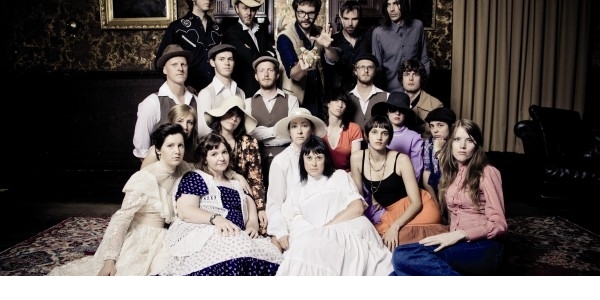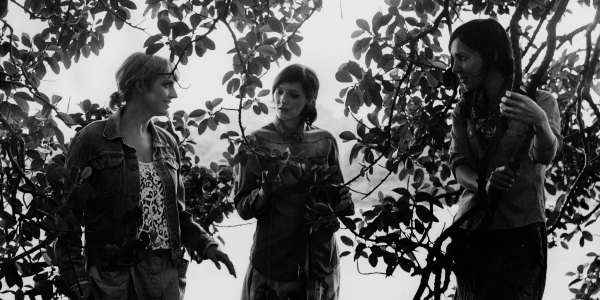Wagons has just returned from his fourth trip to the United States in the last 18 months. It’s bit a long, but ultimately fruitful journey for Wagons from his early days playing residencies at various inner-city Melbourne venues to selling out the Forum Theatre on Wagons’ recent album launch tour. “Wagons didn’t start out as ambitious,” Wagons says. “Our first gig was an open mike gig at the Arthouse, and after that we were offered a gig at the Empress. From there we got some good support shows, and then we became a bit of a residency band, and then we started touring,” he says. Wagons laughs at my suggestion that it’s necessary for a band to prostitute itself in order to develop a following. “I can honestly say that I’ve never had to resort to prostitution – though maybe English teaching is the next step up!” he laughs. “For us it’s always been a natural evolution – if you do gigs that you don’t like, then it’s not enjoyable,” Wagons says.
Wagons’ current focus is on the United States, a market that has appeared before the band’s eyes as a result of some sympathetic and supportive American acts including Those Darlins and Justin Townes Earle. Wagons admits the band may have to make the odd compromise to get a foothold in America. “We’re currently working on opening ourselves up to the US market. And opening ourselves up to the red, white and blue means that we’re open to whatever compromising positions the Statue of Liberty asks us to adopt,” he laughs.
The contrast between playing to 1000 people at the Forum and a few dozen at a bar in North America isn’t significant, in Wagons’ mind at least. “I remember when we’d play the 2am slot at Pony and we’d pretend we were playing the opening slot at Woodstock,” Wagons says. “It doesn’t matter where you’re playing – we want to leave a dollop of our juices on stage. Two weeks after we played the Forum we were playing to 45 people at a bar in Vancouver, and it was no less exiting,” Wagons says.
With his irreverent sense of humour – shared by the members of his band – you could be forgiven for expecting Wagons to be a bit too confronting for the average American audience. A song like Willie Nelson – the Wayfaring Strangers track covered on Wagons’ recent album, Rumble, Shake and Tumble – could easily rub up die-hard Willie Nelson fans the wrong way. Not so, Wagons says. “It’s gone down really well,” Wagons says. “That song has been on high rotation on outlaw country digital radio – that song is brainwashing people as we speak!”
In a live setting, Wagons says the American crowds also seem to be enjoying themselves. “I’m comparing gigs I played at the Empress seven or eight years ago to shows we’re playing in upstate New York now,” Wagons says. “People seem to be responding in the same way as they do here. I have no idea if they understand what I’m saying, but things seem to be going pretty well. Disappointingly there seems to be little cultural barrier,” he laughs.
Wagons’ latest foray to America was to attend an Americana music awards event, at which he hopes he sowed the seed of a possible trip to Europe. “Our exposure to the US comes from playing with people over here – our management in the US is really just an extension of those contacts,” Wagons says. “We haven’t had the same contacts from the UK or Europe. But while I was at this conference I met people from the UK who said we’d have a home over there, so hopefully we can get to the UK and Europe in the next couple of years.”
Dave Graney, a long-time champion of Wagons’ music, noted a few years ago that the lack of national youth radio support for Wagons had been the catalyst for Wagons’ relentless touring regime – which underpinned the band’s rise to national prominence. Despite the success of both The Rise and Fall of Goodtown and Rumble, Shake and Tumble, I tell Wagons that my 22 year-old niece (the only person I know who’ll admit to listening to Triple J) says Wagons is a rare presence on national youth radio. Wagons is philosophical about such things. “Some people get frustrated with the lack of love they get,” he says. “We did get some love, but the music we play doesn’t really fall within the youth demographic. But when the record came out, they did spin the record a few times, and plug our tour a few times,” Wagons says.
It’s the combination of regular, albeit piecemeal, appearances in various media that Wagons says underpins the band’s popularity. “We’re a bit like the crazy uncle who melts down the left over bits of soap at the end of each year and makes a whole new bar of soap,” Wagons says. “We get a lot of love from lots of different sources: radio, newspaper, street press, blogs. We’re not played a lot by anybody, but we’re played by everybody,” he says.
Modern marketing theory says that without a defined brand, it’s difficult to be heard in the cluttered media market. What, then, is the Wagons brand, and how can it be heard in a sea of competing voices? “The more I play around the world, the weirder I think we are,” Wagons says. “What we do tends to stick out in Australia. I thought there’d be similar bands to us in the US, but it doesn’t seem that way – and that doesn’t seem to have stopped us,” he says. For Wagons, it’s the sick and twisted perspectives of the band members – individually and collectively – that provides the band’s defining brand. “It’s not consciously speaking, but we do have a brand that extends from the twistedness and sickness of all of our minds,” Wagons says. “It’s what comes from liking both Porter Wagoner and Tom Jones,” he laughs.

